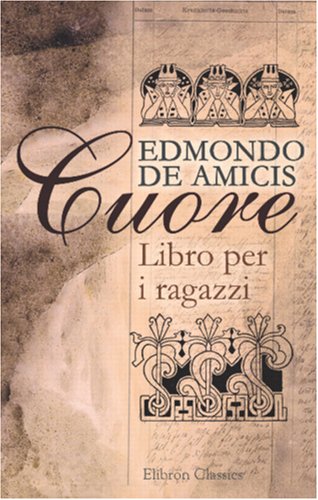 "Cuore" means "Heart" in Italian. This "classic" book by Edmondo De
Amicis describes the life of an Italian school class a few years before
1900, as seen through the eyes of a boy, Enrico.
"Cuore" means "Heart" in Italian. This "classic" book by Edmondo De
Amicis describes the life of an Italian school class a few years before
1900, as seen through the eyes of a boy, Enrico. Given that the book was published in 1886, as a "libro per ragazzi", or "book for Young Adults", in a sense it is an ancestor of the dreadful YA books that nowadays are selling like hot cakes, although "Cuore" is so much more. The book was later utilized for political propaganda by many governments, not only in Italy, and there are some fascinating aspects to the book's history. But before touching on that, I'd like to say this is at its core a very poetic, touching little book. So despite all the political and ridiculously patriotic themes, I really liked it as it stands as a fine portrait of pure feelings, and innocence. Some readers found it sad, I didn't. The author explained how he was inspired to write it by his own son, Furio, and his love for school.
The book reads as an utopian and moralistic fable. Everything and everyone in "Cuore" is idealized - the book was meant to teach school kids the moral values and model behaviors of an idealized Italian citizen. To better understand the source of these values, we need to consider that De Amicis was part of the Italian elite, and his father held a high government post. The people who engineered the unification of Italy in 1860 had one common arch-enemy: the Pope and the Church, who opposed the inclusion of Rome in the new Kingdom of Italy. As a consequence, the school kids in "Cuore" spend their entire school year without ever mentioning, thinking, seeing, or going to a church, which is clearly unrealistic given that (for good and for bad) the Catholic Church has always had an immense influence in the day to day life of Italians. Even Christmas is totally ignored.
Interesting fact: the book was taught in many Italian schools, and that's often the best way to make you hate a book: "Oh, God, please no, not Cuore! I want to kill myself!"
Back to the political themes: it's not too clear whether De Amicis wrote this as pure propaganda for the King, or that was just part of the process. One thing is for sure: according to this book, the perfect kid is the one who sacrifices his own life for his nation and his King. I like to think that this was just a reflection of the author's beliefs, after all patriotism was a widely shared value in those times.
Through its sensitivity to social issues such as poverty, "Cuore" has been initially linked to left-leaning ideologies. De Amicis was later to join the Italian Socialist Party. Because of this, the book remained influential in countries of the European Eastern Bloc. However, its patriotic message was later adopted by Mussolini's government (not exactly your typical lefty group of people) and there are still people who remember "Cuore" being used as fascist propaganda.
In conclusion, I don't know what the author's true purpose was, I just want to remember this book in a good light. Many Italians, when reading this book, comment "These were times when values still mattered!". I don't think that is correct at all. A more precise statement, in my opinion, would be that "Cuore" reminds us of a time when things were much simpler than today (ok, largely because of lack of information), and, as a consequence, it was easier for everybody to point out the right and the wrong.
Despite its honey-drenched soppiness, and the utopistic and moralistic tendencies, "Cuore" is still a very poetic and inspirational book.
No comments:
Post a Comment